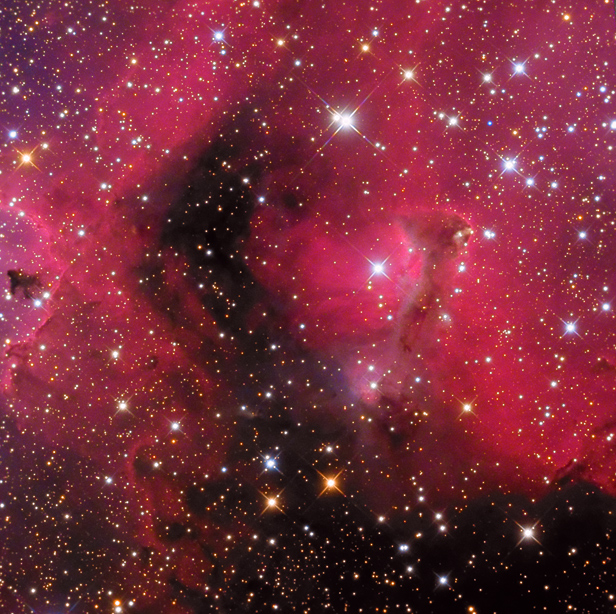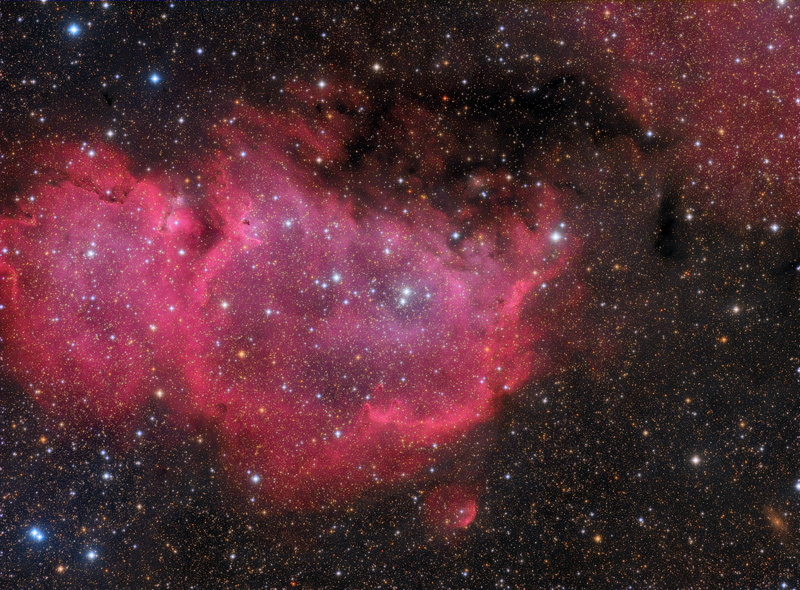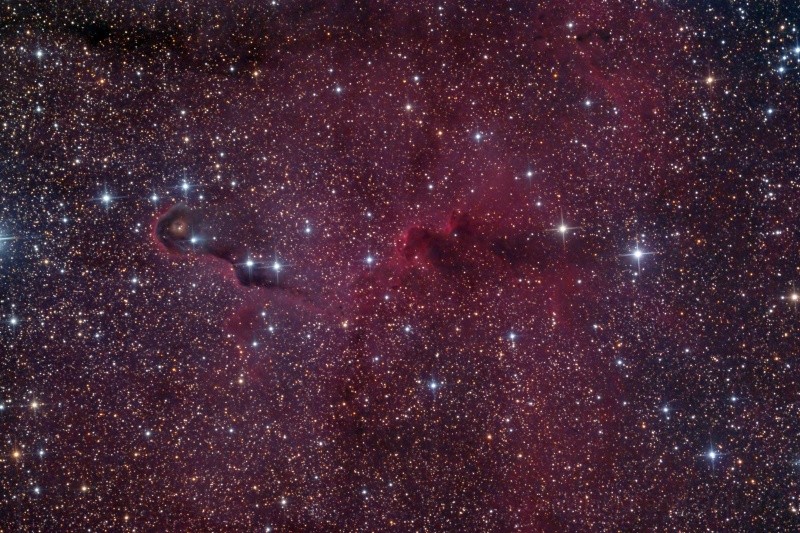Recent Submissions: 2012 December
Re: Recent Submissions: 2012 December
-
markh@tds.net
- Science Officer
- Posts: 117
- Joined: Wed Oct 03, 2012 7:44 pm
Re: Recent Submissions: 2012 December
NGC 1788 in Orion
copyright: Mark Hanson
This is a dark and mysterious creature, kind of a scary sort of image and if nebula had personalities this is one I would not want to meet in a dark ally! For higher resolution images visit http://www.btlguce.com
copyright: Mark Hanson
This is a dark and mysterious creature, kind of a scary sort of image and if nebula had personalities this is one I would not want to meet in a dark ally! For higher resolution images visit http://www.btlguce.com
Re: Recent Submissions: 2012 December
M33 (NGC 598, Triangulum Galaxy) - Spiral Galaxy , type Sc, in Triangulum
http://www.elateobservatory.com
http://www.irida-observatory.org
Copyright: Velimir Popov
M33 (The Triangulum Galaxy) is the member of our local group of galaxies. It is over 50000 light-years in diameter, the third largest in the Local Group of galaxies - only our own Milky Way and M31 (Andromeda Galaxy) are larger. The popular names of M33 include the Pinwheel Galaxy or Triangulum Galaxy.
The spacious spiral arms of M33 are rich in star forming HII regions. M33 is a faint and extended galaxy with a small, almost starlike nucleus. The light haze consist of faint stars, which shines in the yellowish light. Dark dust lanes can be traces into the nucleus. Unlike many other large galaxies, such as the Milky Way and Andromeda, M33 does not have a supermassive black hole in its center. From the nucleus, spiral arms reach out through the disk, which are populated by young hot blueish stars. They have formed from reddish diffuse nebulae, and indicate activity of star formation. Some of the bluish star clouds and reddish H II regions (diffuse nebulae) have been assigned by own NGC or IC numbers. The brightest and most impressive of M33's HII regions is NGC 604. This massive HII region spans about 1500 light years. There are also a number of globular clusters in the spiral arms.
An identification map can be seen here:
Higher resolution and more information is avaliable here ...
Thank you for looking ...
http://www.elateobservatory.com
http://www.irida-observatory.org
Copyright: Velimir Popov
M33 (The Triangulum Galaxy) is the member of our local group of galaxies. It is over 50000 light-years in diameter, the third largest in the Local Group of galaxies - only our own Milky Way and M31 (Andromeda Galaxy) are larger. The popular names of M33 include the Pinwheel Galaxy or Triangulum Galaxy.
The spacious spiral arms of M33 are rich in star forming HII regions. M33 is a faint and extended galaxy with a small, almost starlike nucleus. The light haze consist of faint stars, which shines in the yellowish light. Dark dust lanes can be traces into the nucleus. Unlike many other large galaxies, such as the Milky Way and Andromeda, M33 does not have a supermassive black hole in its center. From the nucleus, spiral arms reach out through the disk, which are populated by young hot blueish stars. They have formed from reddish diffuse nebulae, and indicate activity of star formation. Some of the bluish star clouds and reddish H II regions (diffuse nebulae) have been assigned by own NGC or IC numbers. The brightest and most impressive of M33's HII regions is NGC 604. This massive HII region spans about 1500 light years. There are also a number of globular clusters in the spiral arms.
An identification map can be seen here:
Higher resolution and more information is avaliable here ...
Thank you for looking ...
Re: Recent Submissions: 2012 December
A Box of Cosmic Jewels
http://www.rolfolsenastrophotography.com
Copyright: Rolf Wahl Olsen The Jewel Box Cluster, NGC 4755
Link to high resolution image (4MB) and full details
http://www.rolfolsenastrophotography.com
Copyright: Rolf Wahl Olsen The Jewel Box Cluster, NGC 4755
Link to high resolution image (4MB) and full details
M57, the most detailed image ever taken
Last summer I started processing some Hubble data for the hidden treasures competition. When browsing through the hubble archives today I found this, previously not released, data of M57 from September 2011. I processed this data with the following result. This image shows the ring nebula with a detail never shown before anywhere in the world (as far as I know...).
image
In 1998 an image of this nebula was released by the Hubble team, based on WFC2 data (older instrument). This image was taken with the WFC3 instrument. A comparison can be seen here:
comparison
What I noticed is a strong motion of a star on the right hand side of the nebula which moved clearly in the 15 years between the two images:
animation
Based on observations made with the NASA/ESA Hubble Space Telescope, and obtained from the Hubble Legacy Archive, which is a collaboration between the Space Telescope Science Institute (STScI/NASA), the Space Telescope European Coordinating Facility (ST-ECF/ESA) and the Canadian Astronomy Data Centre (CADC/NRC/CSA). Processing: André van der Hoeven (www.astro-photo.nl)
image
In 1998 an image of this nebula was released by the Hubble team, based on WFC2 data (older instrument). This image was taken with the WFC3 instrument. A comparison can be seen here:
comparison
What I noticed is a strong motion of a star on the right hand side of the nebula which moved clearly in the 15 years between the two images:
animation
Based on observations made with the NASA/ESA Hubble Space Telescope, and obtained from the Hubble Legacy Archive, which is a collaboration between the Space Telescope Science Institute (STScI/NASA), the Space Telescope European Coordinating Facility (ST-ECF/ESA) and the Canadian Astronomy Data Centre (CADC/NRC/CSA). Processing: André van der Hoeven (www.astro-photo.nl)
-
Wade Earle
Re: Recent Submissions: 2012 December
This is a composite of all the Geminid meteors captured over Pendleton, Oregon on the evening of December 13, 2012. I took these from Emigrant Hill. In the valley below, you can see the light “footprint” of Pendleton, Mission, the Wildhorse Casino, and several other smaller towns. Fog has enveloped most of the cities below.
URL Higher resolution link
Copyright: Thomas W. Earle
URL Higher resolution link
Copyright: Thomas W. Earle
-
davidkingham
- Asternaut
- Posts: 2
- Joined: Mon Aug 13, 2012 1:48 am
Re: Recent Submissions: 2012 December
Eye of the Needle Geminids Meteor Shower
http://www.davidkinghamphotography.com
Copyright: David Kingham
Larger Version
http://www.davidkinghamphotography.com
Copyright: David Kingham
Larger Version
- Sergio
- Friendly Neighborhood Astrophotographer
- Posts: 100
- Joined: Mon Aug 29, 2011 5:26 pm
- Location: Buenos Aires, Argentina
- Contact:
Re: Recent Submissions: 2012 December
IC 2220 in Carina (aka The Toby Jug Nebula)
IC2220 is the result of the reflection of gas and star material coming ejected from the red giant HD 65750. The dust emitted from the red star is not displaced equally in all directions. It is thought that the material is distributed via magnetic fields, electric fields or the rotation of the central star giving an irregular shape. Astro photographer David Malin called this object the Toby Jug Nebula after the english drinking vessel. For some others the shape resembles a similarity with a flying butterfly.
More information and the image in lager resolution in
http://www.baskies.com.ar
Cheers to all !!
Sergio
IC2220 is the result of the reflection of gas and star material coming ejected from the red giant HD 65750. The dust emitted from the red star is not displaced equally in all directions. It is thought that the material is distributed via magnetic fields, electric fields or the rotation of the central star giving an irregular shape. Astro photographer David Malin called this object the Toby Jug Nebula after the english drinking vessel. For some others the shape resembles a similarity with a flying butterfly.
More information and the image in lager resolution in
http://www.baskies.com.ar
Cheers to all !!
Sergio
Re: Recent Submissions: 2012 December
Here is the Hubble image of M57 combined with data from the Subaru Telescope in Hawaii. The data was kindly provided by Robert Gendler.
Based on observations made with the NASA/ESA Hubble Space Telescope, and obtained from the Hubble Legacy Archive, which is a collaboration between the Space Telescope Science Institute (STScI/NASA), the Space Telescope European Coordinating Facility (ST-ECF/ESA) and the Canadian Astronomy Data Centre (CADC/NRC/CSA) and data from the Subaru 8.2 m telescope (NAOJ). Processing: André van der Hoeven/Robert Gendler
Full resolution
Based on observations made with the NASA/ESA Hubble Space Telescope, and obtained from the Hubble Legacy Archive, which is a collaboration between the Space Telescope Science Institute (STScI/NASA), the Space Telescope European Coordinating Facility (ST-ECF/ESA) and the Canadian Astronomy Data Centre (CADC/NRC/CSA) and data from the Subaru 8.2 m telescope (NAOJ). Processing: André van der Hoeven/Robert Gendler
Full resolution
-
AstroPaolo
- Ensign
- Posts: 11
- Joined: Tue Dec 18, 2012 12:07 am
Re: Recent Submissions: 2012 December
Very fast solar prominence time-lapse with Daystar h-alpha filter (to look in HD) 

The timelapse represent a close up portion of the sun of 30 July with the evolution of a fast prominence during half hour of observation.
Images taken with a 100 ed refractor using a Daystar h-alpha filter at a focal of 2300mm.
Given the very fast nature of the phenomenon I preferred to use intervals of 30 seconds to 30 seconds of capture, so having one frame every minute, maybe I could shorten it further but the seeing was not so good and I wanted to gather more data to obtain better images.

The timelapse represent a close up portion of the sun of 30 July with the evolution of a fast prominence during half hour of observation.
Images taken with a 100 ed refractor using a Daystar h-alpha filter at a focal of 2300mm.
Given the very fast nature of the phenomenon I preferred to use intervals of 30 seconds to 30 seconds of capture, so having one frame every minute, maybe I could shorten it further but the seeing was not so good and I wanted to gather more data to obtain better images.
Re: Recent Submissions: 2012 December
Just a simple M45
Copyright: Lóránd Fényes Orignal: http://www.pleiades.hu/galeria/kozmosz2 ... mal/45.jpg
Copyright: Lóránd Fényes Orignal: http://www.pleiades.hu/galeria/kozmosz2 ... mal/45.jpg
-
ftherrmann
- Science Officer
- Posts: 141
- Joined: Sun Jan 30, 2011 2:56 am
-
Marco Angelini
- Ensign
- Posts: 40
- Joined: Sat Jan 07, 2012 12:44 am
Re: Recent Submissions: 2012 December
M76: The "Little Dumbbell" Nebula in Perseo.
A nice "bipolar" planetary nebula on a rich star field with several little galaxies on the background
Authors: M. Angelini - F. Antonucci - F. Tagliani
ADARA Astrobrallo: http://www.astrobrallo.com
Image details & info: http://www.astrobrallo.com/gallery/inde ... -marco-enh
Full-res: http://www.astrobrallo.com/gallery/var/ ... 1355840315
A nice "bipolar" planetary nebula on a rich star field with several little galaxies on the background
Authors: M. Angelini - F. Antonucci - F. Tagliani
ADARA Astrobrallo: http://www.astrobrallo.com
Image details & info: http://www.astrobrallo.com/gallery/inde ... -marco-enh
Full-res: http://www.astrobrallo.com/gallery/var/ ... 1355840315
-
maphilli14
- Ensign
- Posts: 35
- Joined: Tue May 08, 2012 2:32 am
Re: Recent Submissions: 2012 December
Every year I make a best of Solar System. This year was exciting for me with the birth of my 4th child, the Venus Transit, a visit from renowned amateur astronomer, Chris Go and Google came to my house to film a short video on the Virtual Star Party hosted though Universe Today. This photo is somewhat incomplete and missing Uranus, Venus in UV, this is not my best Mars and I have to add Ceres and Vesta in High Res. With the push for holiday time off and the timeliness of getting a good "New Years" post, I thought it wise to share the preview!
Included now are, Venus Transit, 2x comets, 2x asteroids
Mike
Included now are, Venus Transit, 2x comets, 2x asteroids
Mike
Re: Recent Submissions: 2012 December
The Rosette Nebula .....NGC 2237
Copyright: Ken Walker
Canon EOS 60da FLT98 DDG
CGEM
PixInsight
http://i201.photobucket.com/albums/aa28 ... 220122.png
Roughly 5000 light years away and 130 light years across
the image nearly filled the sensor of My 60da DSLR through the FLT98.
Imaged in the red zone in San Diego CA amongst the neighbors Christmas lights.
Copyright: Ken Walker
Canon EOS 60da FLT98 DDG
CGEM
PixInsight
http://i201.photobucket.com/albums/aa28 ... 220122.png
Roughly 5000 light years away and 130 light years across
the image nearly filled the sensor of My 60da DSLR through the FLT98.
Imaged in the red zone in San Diego CA amongst the neighbors Christmas lights.
Last edited by kwalker on Wed Dec 19, 2012 10:35 pm, edited 1 time in total.
Persistent train from Geminid meteor
Persistent train from a Geminid meteor
Copyright: Dave Liu
Montage showing how the persistent train from a recent Geminid meteor (streak was just under 5 degrees) distorts in the atmosphere. Each exposure was 10 seconds: left column shows normal colours, middle column has the star background subtracted and meteor train histogram-stretched, and right column has stars subtracted and entire image inverted for greater contrast.
The same meteor and its train can also be seen in this time lapse video (representing 14 minutes of elapsed time):
https://dl.dropbox.com/u/13644418/iis/G ... rTrain.mp4
Copyright: Dave Liu
Montage showing how the persistent train from a recent Geminid meteor (streak was just under 5 degrees) distorts in the atmosphere. Each exposure was 10 seconds: left column shows normal colours, middle column has the star background subtracted and meteor train histogram-stretched, and right column has stars subtracted and entire image inverted for greater contrast.
The same meteor and its train can also be seen in this time lapse video (representing 14 minutes of elapsed time):
https://dl.dropbox.com/u/13644418/iis/G ... rTrain.mp4
Re: Recent Submissions: 2012 December
The south pole
Copyright: Petr Horálek, Obseravtory Úpice (http://www.obsupice.cz/new/_ohvezdarne. ... ohvezdarne)
This composition of south pole I made during my trip to Australia. The pole was around 16 degrees above horizon, but the sky was relatively dark (Mareeba city was around 120 km south, there were just cirrus clouds). It is stack of 68 images (15 s, ISO 1600, Samyang 24 mm/1.4, f2.8, Canon 550D on tripod, dark frames applied).
Higher dimension: http://www.astronom.cz/horalek/gallery/ ... l_full.jpg
Copyright: Petr Horálek, Obseravtory Úpice (http://www.obsupice.cz/new/_ohvezdarne. ... ohvezdarne)
This composition of south pole I made during my trip to Australia. The pole was around 16 degrees above horizon, but the sky was relatively dark (Mareeba city was around 120 km south, there were just cirrus clouds). It is stack of 68 images (15 s, ISO 1600, Samyang 24 mm/1.4, f2.8, Canon 550D on tripod, dark frames applied).
Higher dimension: http://www.astronom.cz/horalek/gallery/ ... l_full.jpg
-
ftherrmann
- Science Officer
- Posts: 141
- Joined: Sun Jan 30, 2011 2:56 am
Re: Recent Submissions: 2012 December
-
grantcollier
- Ensign
- Posts: 19
- Joined: Mon Oct 04, 2010 3:59 am
Re: Recent Submissions: 2012 December
Geminids over Rocky Mountain National Park
http://www.gcollier.com
Copyright: Grant Collier

I captured this shot of the Geminids meteor shower at Lily Lake in Rocky Mountain National Park. I did one big stitched image of about 400 megapixels to capture the sky and foreground. And I used a 14mm lens to capture all the meteors. Then I took each of the frames with meteors and up-rezed and aligned them with the larger stitched image, before masking out everything but the meteors in those images. In all there's about 26 meteors in this shot. I believe the Andromeda Galaxy is to the left of the Milky Way.
http://www.gcollier.com
Copyright: Grant Collier

I captured this shot of the Geminids meteor shower at Lily Lake in Rocky Mountain National Park. I did one big stitched image of about 400 megapixels to capture the sky and foreground. And I used a 14mm lens to capture all the meteors. Then I took each of the frames with meteors and up-rezed and aligned them with the larger stitched image, before masking out everything but the meteors in those images. In all there's about 26 meteors in this shot. I believe the Andromeda Galaxy is to the left of the Milky Way.
-
ftherrmann
- Science Officer
- Posts: 141
- Joined: Sun Jan 30, 2011 2:56 am
Re: Recent Submissions: 2012 December
-
ftherrmann
- Science Officer
- Posts: 141
- Joined: Sun Jan 30, 2011 2:56 am
Re: Recent Submissions: 2012 December
Re: Recent Submissions: 2012 December
My Christmas card, iridescences and eagles booted, to Starship Asterisk and all his followers. Happy Solstice.
Mi tarjeta de navidad, iridiscencias y águilas calzadas, para Starship Asterisk y todos sus seguidores. Feliz Solsticio.
Mi tarjeta de navidad, iridiscencias y águilas calzadas, para Starship Asterisk y todos sus seguidores. Feliz Solsticio.
-
terry.hancock
- Ensign
- Posts: 97
- Joined: Sat Jul 17, 2010 4:38 am
Re: Recent Submissions: 2012 December
M42 Series of The Great Nebula in Orion
I present to you 4 different versions of this majestic nebula, created using broad band and narrow band filters. I decided to orient it this way as it reminded me of a christmas tree with NGC1977 "The Running Man Nebula" representing the base. Total integration time 17.8 hours
Copyright: Terry Hancock
CFHT Palatte (Canada France Hawaii Telescope technique)
http://www.flickr.com/photos/terryhanco ... hotostream HST Palette (Hubble technique)
http://www.flickr.com/photos/terryhanco ... hotostream Natural/False Color Hybrid (a combination of broad band and narrow band filters)
http://www.flickr.com/photos/terryhanco ... hotostream LRGB + H-Alpha (a more traditional and natural view using RGB and H-Alpha filters)
http://www.flickr.com/photos/terryhanco ... hotostream
I present to you 4 different versions of this majestic nebula, created using broad band and narrow band filters. I decided to orient it this way as it reminded me of a christmas tree with NGC1977 "The Running Man Nebula" representing the base. Total integration time 17.8 hours
Copyright: Terry Hancock
CFHT Palatte (Canada France Hawaii Telescope technique)
http://www.flickr.com/photos/terryhanco ... hotostream HST Palette (Hubble technique)
http://www.flickr.com/photos/terryhanco ... hotostream Natural/False Color Hybrid (a combination of broad band and narrow band filters)
http://www.flickr.com/photos/terryhanco ... hotostream LRGB + H-Alpha (a more traditional and natural view using RGB and H-Alpha filters)
http://www.flickr.com/photos/terryhanco ... hotostream





















